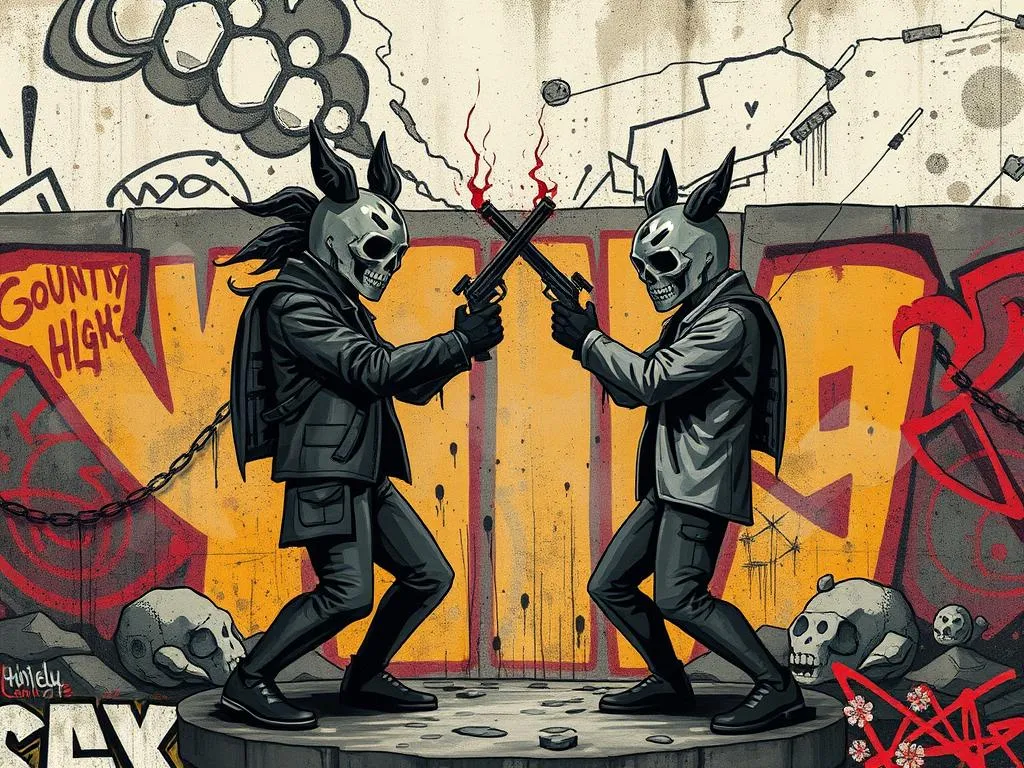Violence Or Conflict Dream Meaning

Dreams involving violence or conflict can leave us feeling shaken or confused. They often manifest as intense scenarios that evoke strong emotions. Understanding the violence or conflict dream meaning can provide valuable insights into our waking lives, revealing hidden fears, unresolved issues, or even personal growth opportunities. In this blog post, we will explore the characteristics of these dreams, their interpretations, and their symbolic links to our daily experiences.
About Violence and Conflict Dreams
Key Characteristics
Dreams about violence or conflict may include:
- Aggression: Seeing or experiencing acts of aggression, whether physical or verbal.
- Fear: A strong sense of fear or anxiety that accompanies the dream.
- Chaos: A chaotic environment where normal rules do not apply.
- Powerlessness: Feeling unable to control the situation, leading to a sense of helplessness.
These characteristics can vary widely among individuals, but they often point to underlying emotions or situations in our waking life.
Symbolic Meaning
The symbolic meaning of violence or conflict dreams often revolves around:
- Inner turmoil: Reflecting internal struggles, whether they are emotional, psychological, or relational.
- Unresolved issues: Highlighting conflicts in your life that need attention.
- Fear of loss: Fearing the loss of control, relationships, or security.
Understanding these symbols can help in interpreting what your subconscious mind is trying to communicate.
Common Contexts
Violence or conflict dreams can emerge in various contexts, including:
- Personal Relationships: Conflicts with friends, family, or partners.
- Work Situations: Stressful encounters with colleagues or superiors.
- Societal Issues: Concerns about violence in the community or the world.
Recognizing the context of your dream can significantly enhance your understanding of its meaning.

Dream Interpretation of Violence and Conflict
Core Meaning
At its core, the violence or conflict dream meaning often relates to your personal feelings and experiences. These dreams can signify:
- Repressed emotions: Feelings that you have not expressed might bubble to the surface.
- Fear of confrontation: A fear of facing difficult situations or people in your life.
- Desire for resolution: A subconscious wish to resolve ongoing conflicts.
When interpreting these dreams, consider what aspects of your life are causing you distress or anxiety.
Emotional Connections
The emotions you experience during a violence or conflict dream are crucial for interpretation. Common emotional responses include:
- Fear: A sense of dread or panic that can wake you up.
- Anger: Feelings of rage, either directed at someone or at the situation itself.
- Sadness: A deep sense of loss or disappointment.
These emotions can help you identify areas in your waking life that may need healing or attention.
Key Messages
Dreams about violence or conflict often carry important messages, such as:
- Acknowledgment of pain: It may be time to address your emotional pain.
- Need for communication: Open dialogue in your relationships can help resolve conflicts.
- Self-exploration: Engaging in self-reflection can lead to personal growth and understanding.
Listening to these messages can guide you towards a healthier emotional state.
Related Dreams
Similar Dream Scenarios
In addition to violence or conflict dreams, you might also experience related scenarios, such as:
- Chased Dreams: Feeling pursued can symbolize avoidance of issues.
- Falling Dreams: Often represent a loss of control or insecurity.
- Natural Disasters: These can reflect feelings of chaos in your life.
Each of these dreams may share similar themes of conflict or emotional struggle, and understanding them can lead to deeper insights.
Symbolic Links
The symbolic links between various dream types can create a broader understanding of your subconscious mind. For example:
- Fear: Underscores the emotional foundation of most conflict dreams.
- Control: A central theme in dreams about being chased or falling, indicating deeper feelings of powerlessness.
- Resolution: Dreams often point to a need for closure or peace in various aspects of life.
Recognizing these connections can enhance your ability to interpret your dreams effectively.
Conclusion
In summary, understanding the violence or conflict dream meaning can be enlightening. These dreams often reveal our deepest fears, unresolved issues, and emotional challenges. By reflecting on the key characteristics, core meanings, and emotional connections of these dreams, we can gain valuable insights into our waking lives.
As you explore your dreams, remember to take time for personal reflection. Consider what emotions and situations may be causing you distress or conflict. Engaging with your dreams can be a powerful tool for healing and personal growth. By acknowledging and addressing these feelings, you can navigate your life with greater clarity and peace.









